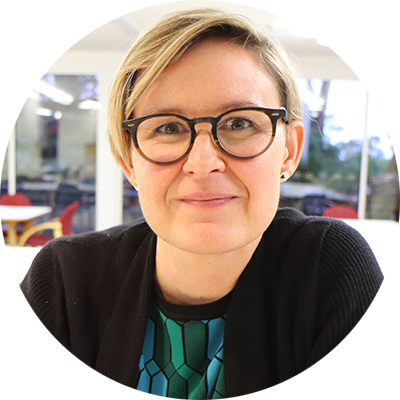Two recent Royal Commissions shocked Australians by exposing the over-reliance on chemical and physical restraints to manage people’s behaviour in disability and aged care settings, with evidence presented of aversive practices where people were physically bound and routinely medicated.
Both the Royal Commission into Violence, Abuse, Neglect and Exploitation of People with Disability and the Aged Care Royal Commission highlighted the need for alternative approaches to behaviour support that put people foremost and protect human rights.
Flinders University Disability and Community Inclusion researcher Dr Alinka Fisher is committed to building and promoting values-driven and rights-based supports using a Positive Behaviour Support (PBS) approach.
PBS might offer one solution to concerns regarding behaviour support practice in Australia, although there is significant work to be done to shift attitudes, build a capable PBS workforce and establish the systems required to support evidence-informed practice.
“PBS provides a framework to guide a very individualised and person-centred approach to behaviour support and is recommended internationally,” says Dr Fisher.
“Challenging behaviours can have a significant impact on a person’s quality of life – for example, their relationships, community participation and opportunities. They may also present risk of harm to the person and others.
“These behaviours might include physical or verbal aggression, property destruction and inappropriate social or sexual behaviour – but other behaviours like reduced initiation and apathy may also present significant challenges for the person and those providing support.
“We refer to these as ‘challenging behaviours’ because they challenge the service system to come up with an appropriate response…we are certainly not labelling the person as a ‘challenge’.
Dr Fisher explains the importance of addressing attitudes and improving environments as a first step towards finding a solution.
“Sometimes those providing support may be quick to blame the person, as if their behaviour is a problem that needs ‘fixing’ – but this feeds stigmatisation around behaviour that is not accurate or helpful.”
“Behaviour support plans are very much focused on systemic improvements – in fact, they are much less about changing the person’s behaviour than changing the behaviours of support networks.
The origins and causes of challenging behaviour are many and varied. There may be organic contributors relating to behaviour change, for example mental health issues, brain injury or early-onset dementia.
As Dr Fisher describes, ‘challenging behaviours’ are the result of interactions between the person, their environment and broader systems. We need to understand this relationship to inform effective support strategies.
Often, she says, challenging behaviours can be a result of ineffective systems that do not adequately address a person’s support needs, and then a person might express this unmet need through challenging behaviours.
“Behaviour support plans are very much focused on systemic improvements – in fact, they are much less about changing the person’s behaviour than changing the behaviours of support networks.”
“PBS is a holistic approach that emphasises preventative strategies. For example, if a person has an accessible and meaningful environment, and capable support networks, then this will have a significant impact on their quality of life and may prevent challenging behaviour in the first place.”
Dr Fisher’s research focuses on building and promoting PBS as a preventive, systems-wide and tiered approach to behaviour support.
“This is an important aspect of my research because often a person is referred to a behaviour support practitioner for specialist support before the most basic and rights-based systems and supports are even in place – those that create an accessible, predictable and meaningful environment. This isn’t okay and is a really inefficient use of resourcing.”
She is also focused on building the capabilities of families in providing effective behaviour support and is currently working with a team in NSW to examine the feasibility of a PBS family education program for adults with dementia. Another of her projects is developing and trialling a PBS training and mentoring program to build capabilities of aged care organisations in providing effective behaviour support to people with dementia.
This emphasises Dr Fisher’s focus on educating families and building effective behaviour support systems from the ground level up.
Sometimes, she says, behaviour support practitioners are required to develop specialist and comprehensive behaviour intervention plans, but “we could better use resources if we had the foundations of good practice in place – reserving specialist behaviour support for where it’s really needed”.
While the practice of PBS has been around for a long time, it has gained momentum in Australia following the introduction of the National Disability Insurance Scheme (NDIS) in 2013.
“The disability service landscape has been shaped significantly through the introduction of the NDIS because it names and funds positive behaviour support. It has been a gamechanger,” Dr Fisher says.
There are now thousands of PBS providers in Australia. However, there are some concerns regarding PBS policy and implementation funded by the NDIS, and a recognised need to upskill our behaviour support workforce.
“The NDIS Quality and Safeguards Commission is aware that work needs to be done,” she says. “They have initiated some important work focused on improving the quality of PBS service provision”. This includes two NDIS-funded projects that Dr Fisher is involved with – one intent on giving more voice to people around their behaviour support and helping them to understand their rights, and another to build the capabilities of behaviour support practitioners.
Although there appears much to be done in improving behaviour support in Australia, the work of Dr Fisher and her colleagues provides hope for all people to have better lives.
“The disability service landscape has been shaped significantly through the introduction of the NDIS because it names and funds positive behaviour support. It has been a gamechanger,”
Download your free copy of Fearless Research
![]()
Sturt Rd, Bedford Park
South Australia 5042
South Australia | Northern Territory
Global | Online
CRICOS Provider: 00114A TEQSA Provider ID: PRV12097 TEQSA category: Australian University










